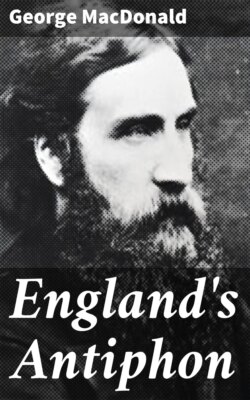Читать книгу England's Antiphon - George MacDonald - Страница 5
На сайте Литреса книга снята с продажи.
INTRODUCTION.
ОглавлениеTable of Contents
If the act of worship be the highest human condition, it follows that the highest human art must find material in the modes of worship. The first poetry of a nation will not be religious poetry: the nation must have a history at least before it can possess any material capable of being cast into the mould of religious utterance; but, the nation once possessed of this material, poetry is the first form religious utterance will assume.
The earliest form of literature is the ballad, which is the germ of all subsequent forms of poetry, for it has in itself all their elements: the lyric, for it was first chanted to some stringed instrument; the epic, for it tells a tale, often of solemn and ancient report; the dramatic, for its actors are ever ready to start forward into life, snatch the word from the mouth of the narrator, and speak in their own persons. All these forms have been used for the utterance of religious thought and feeling. Of the lyrical poems of England, religion possesses the most; of the epic, the best; of the dramatic, the oldest.
Of each of these I shall have occasion to speak; but, as the title of the book implies—for Antiphon means the responsive song of the parted choir—I shall have chiefly to do with the lyric or song form.
For song is the speech of feeling. Even the prose of emotion always wanders into the rhythmical. Hence, as well as for other reasons belonging to its nature, it is one chief mode in which men unite to praise God; for in thus praising they hold communion with each other, and the praise expands and grows.
The individual heart, however, must first have been uplifted into praiseful song, before the common ground and form of feeling, in virtue of which men might thus meet, could be supplied. But the vocal utterance or the bodily presence is not at all necessary for this communion. When we read rejoicingly the true song-speech of one of our singing brethren, we hold song-worship with him and with all who have thus at any time shared in his feelings, even if he have passed centuries ago into the "high countries" of song.
My object is to erect, as it were, in this book, a little auricle, or spot of concentrated hearing, where the hearts of my readers may listen, and join in the song of their country's singing men and singing women.
I will build it, if I may, like a chapel in the great church of England's worship, gathering the sounds of its never-ceasing choir, heart after heart lifting up itself in the music of speech, heart after heart responding across the ages. Hearing, we worship with them.
For we must not forget that, although the individual song springs from the heart of the individual, the song of a country is not merely cumulative: it is vital in its growth, and therefore composed of historically dependent members. No man could sing as he has sung, had not others sung before him. Deep answereth unto deep, face to face, praise to praise. To the sound of the trumpet the harp returns its own vibrating response—alike, but how different! The religious song of the country, I say again, is a growth, rooted deep in all its story.
Besides the fact that the lyric chiefly will rouse the devotional feeling, there is another reason why I should principally use it: I wish to make my book valuable in its parts as in itself. The value of a thing depends in large measure upon its unity, its wholeness. In a work of these limits, that form of verse alone can be available for its unity which is like the song of the bird—a warble and then a stillness. However valuable an extract may be—and I shall not quite eschew such—an entire lyric, I had almost said however inferior, if worthy of a place at all, is of greater value, especially if regarded in relation to the form of setting with which I hope to surround it.
There is a sense in which I may, without presumption, adopt the name of Choragus, or leader of the chorus, in relation to these singers: I must take upon me to order who shall sing, when he shall sing, and which of his songs he shall sing. But I would rather assume the office of master of the hearing, for my aim shall be to cause the song to be truly heard; to set forth worthy points in form, in matter, and in relation; to say with regard to the singer himself, his time, its modes, its beliefs, such things as may help to set the song in its true light—its relation, namely, to the source whence it sprung, which alone can secure its right reception by the heart of the hearer. For my chief aim will be the heart; seeing that, although there is no dividing of the one from the other, the heart can do far more for the intellect than the intellect can do for the heart.
We must not now attempt to hear the singers of times so old that their language is unintelligible without labour. For this there is not room, even if otherwise it were desirable that such should divide the volume. We must leave Anglo-Saxon behind us. In Early English, I shall give a few valuable lyrics, but they shall not be so far removed from our present speech but that, with a reasonable amount of assistance, the nature and degree of which I shall set forth, they shall not only present themselves to the reader's understanding, but commend themselves to his imagination and judgment.
